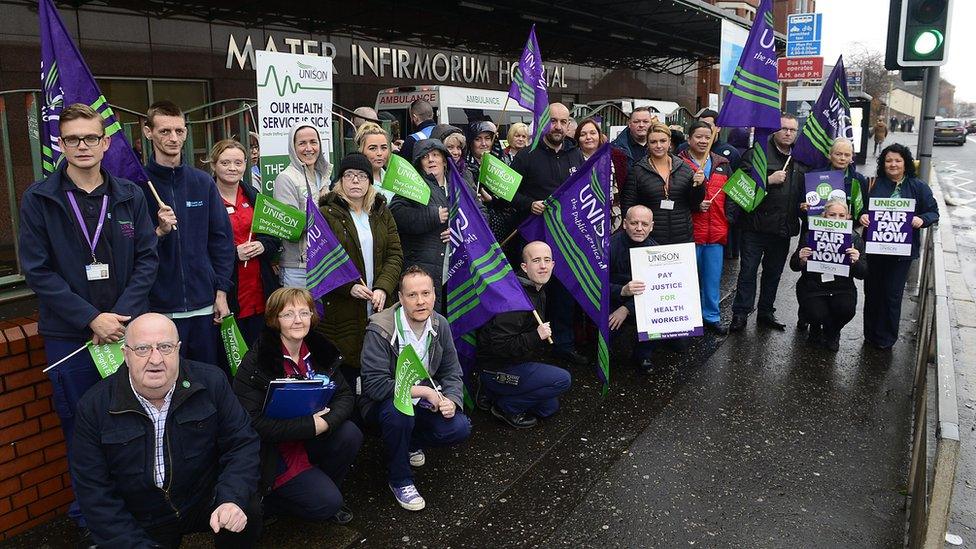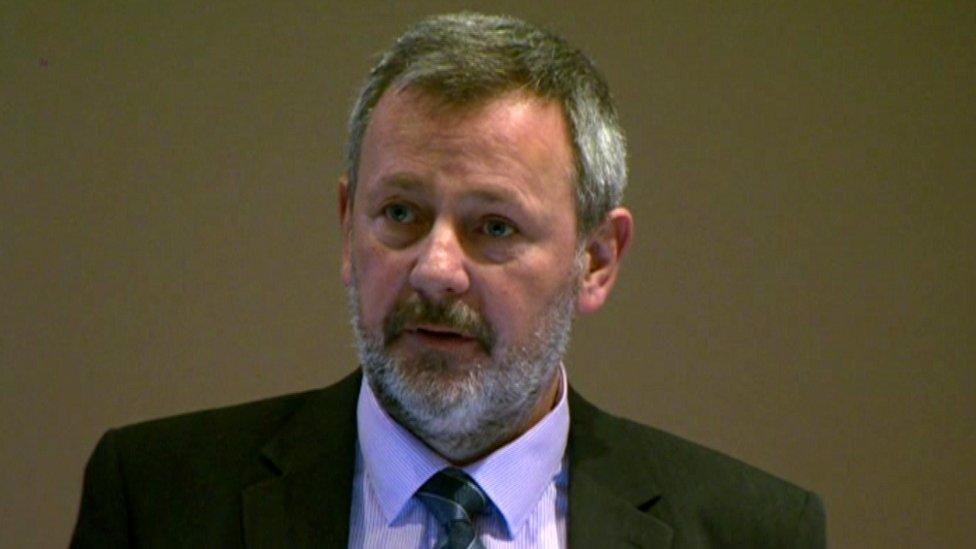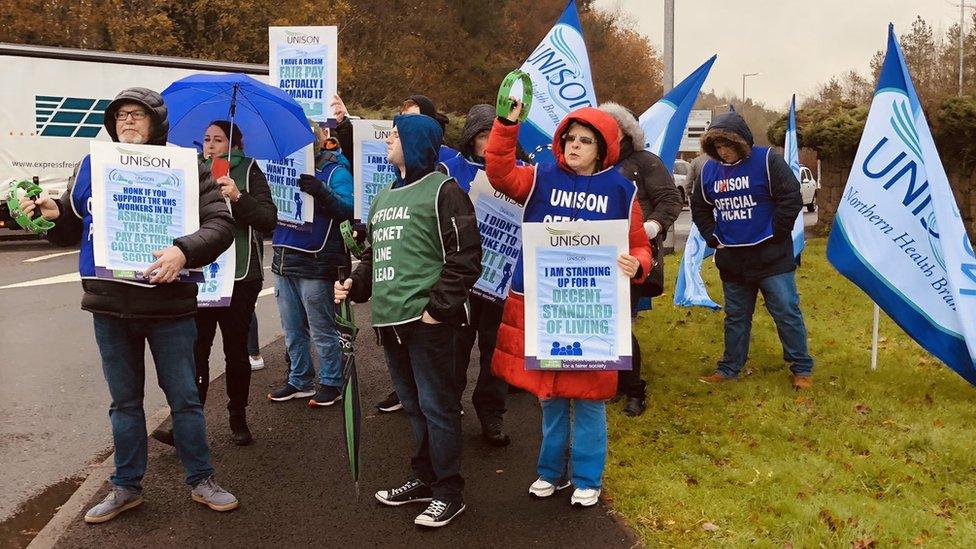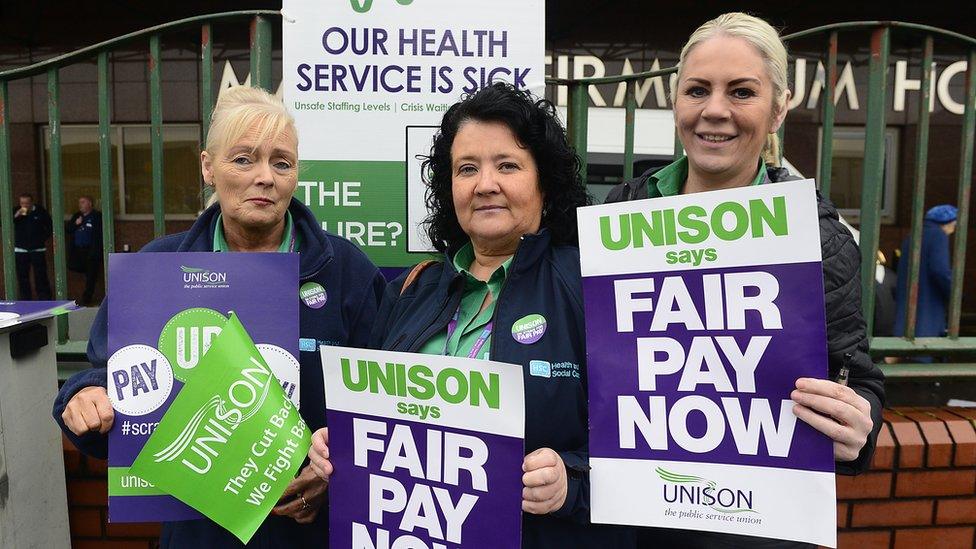NI Civil Service 'regret' as Unison healthcare workers strike
- Published

Unison workers strike in Belfast
Northern Ireland civil service leaders say there is "deep regret" that health workers' trade unions are proceeding with industrial action.
Members of Unison - NI's largest health workers' union - have gone on strike over pay and staffing levels.
Unison represents about 25,000 healthcare workers including nurses, social care staff, support services but not doctors.
The first phase of industrial action runs from 25 November.
It ends on 18 December and phase two will run to March 2020.
Department of Health Permanent Secretary Richard Pengelly said the department "did everything in its power to prevent industrial action", including a pay offer which would add 2.1% to the wage bill for Agenda for Change staff.
"Intensive contingency planning is being undertaken to mitigate the impact of industrial action on patients and other service users," he said.

Richard Pengelly said that in the absence of ministers at Stormont, departments are "constrained"
"It is nevertheless inevitable that there will be an impact on patients. This has been publicly acknowledged by the trade union leadership."
The head of the civil service David Sterling added that he was "very aware of the deep frustrations in public sector workforces" but said there are "no easy fixes".
Strike action will take place across the five health and social care trusts.
The first phase will include Unison members in:
Sterile services across major hospitals;
Hospital and social services transport services across the Belfast and Northern trusts;
Support services (domestic services, portering, catering laundry etc) in the Ulster Hospital and Lagan Valley Hospital;
Portering services in Craigavon Hospital.
What will it entail?
Several hospitals were affected on Monday, including the Antrim Area Hospital, Belfast City Hospital and the Ulster Hospital.
Workers are withdrawing their labour at different times throughout the day.
Staff working in sterile services at Antrim Area Hospital were at the picket line from 08:00 GMT. Support staff at the Ulster Hospital were at the picket line at 12:00 GMT, followed by sterile service staff at Belfast City Hospital at 12:30 GMT.
Other services outside hospitals are likely to be affected by the strike as drivers will not be taking patients to facilities or service providers.

Unison members at the picket line at Antrim Area Hospital
The action also includes not working overtime, not working unpaid hours and not completing paperwork other than individual patient records.
Unison regional secretary Patricia McKeown said they were determined to "fight for justice on both pay and staffing levels".
"In the face of a spiralling crisis in our health and social services system, not of their own making, Unison members are taking the brave step of being the first workers to take industrial action," she said.
Standing at the picket line at Antrim Hospital, Stephanie Greenwood, Unison northern branch chairperson, told BBC's Good Morning Ulster programme that public support had been "phenomenal".
She said transport drivers will be on the picket line on Tuesday, adding that "not a wheel will turn in the Northern Trust area".
"There will inevitably be an impact on patient and services users," she said.
She added: "We have patients and clients on this picket line with us today. We have had messages of support from the public all morning."

Healthcare workers on strike outside Belfast's Mater Hospital
Contingency plans
Nurses in Northern Ireland are due to strike next month over staffing numbers and pay disputes.
It will be the first time in the Royal College of Nursing's 103-year-history that such action has been taken in the UK.
The Unite members' ballot on industrial action is due to close this week.
On Friday, talks on pay between the health unions and the Department of Health ended without agreement.
Richard Pengelly, Department of Health permanent secretary, said the pay offer was "the best we can afford given the budgetary constraints and limited authority in the absence of a minister".
"While we believe that the trade unions will do all they can to avert adverse impacts on services resulting from industrial action, potentially we are entering a situation where none of us can predict what the consequences might be," he said.
The trusts has developed contingency plans to mitigate potential disruption as much as possible, he added, and the continued focus during the industrial action would be on the provision of safe care.
- Published22 November 2019
